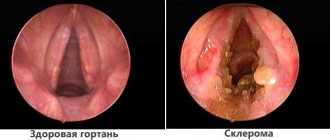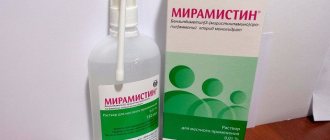Features of treatment during pregnancy
For women in the 2nd trimester of pregnancy with sore throat, treatment is selected strictly individually. The effect of the therapy will be much higher if the following recommendations are followed:
- during illness, it is necessary to maintain bed rest and limit physical activity, which will speed up the restoration of the body’s internal strength and improve the functioning of the immune system;
- it is necessary to provide the woman with a complete and varied diet, refusing food that irritates the mucous membrane of the throat;
- It is recommended to drink as much fluid as possible during the day, which will speed up the elimination of toxic products from the body and reduce fever;
- Women in the 2nd trimester of pregnancy with a sore throat should take a complex of vitamins selected by a doctor;
- the room should be wet cleaned every day and ventilated as often as possible;
- Avoid contact with sick people, and during the epidemic do not visit public places.
Drug treatment
Taking into account the causes and level of severity of the disease, pregnant women are treated with a course of antibiotics, various throat lozenges are also prescribed, and treatment solutions are used. The doctor prescribes antiviral agents and herbal infusions. You should also be sure to reconsider your eating habits so as not to irritate your mucous membranes. In addition, it is also important to maintain bed rest.
It is impossible to treat a sore throat during pregnancy in the 3rd trimester without the knowledge of the doctor. A leading gynecologist or general practitioner may recommend the following medications:
- Bioparox is an absolutely safe product that does not penetrate the placenta and does not harm the baby. The drug is prescribed to cure respiratory tract diseases caused by streptococcal infection and other microorganisms. The medicine has a detrimental effect on the pathogenic flora, is characterized by an anti-inflammatory effect, relieves swelling of the mucous membrane, after injection the throat stops hurting, the inflammation subsides. The course of therapy is prescribed exclusively by the treating doctor.
- Penicillin penetrates the placental barrier, but does not affect the baby's body. Such drugs do not linger and are quickly eliminated from the body by the kidneys.
- Cephalosporins are safe drugs; penetration through the placental barrier is minimal.
- Drugs such as Erythromycin can be used for throat pathologies. They do not affect the health of the unborn child.
Article on the topic: Can Bioparox® be used during pregnancy?
Pills and lozenges for the throat during pregnancy in the 3rd trimester:
- The drug Lizobakt successfully fights pathogens and is absolutely safe.
- Neonangin has an analgesic and antiseptic effect. Treatment with tablets relieves inflammation in the throat.
- If there is inflammation in the oral cavity, doctors may recommend taking the drug Tantum Verde. Sold in the form of a spray or rinse.
- Faringosept lozenges have a powerful antibacterial effect, are used for pathologies of the oral cavity and respiratory tract, and are absolutely harmless to the baby.
Causes of sore throat
All factors that can provoke the appearance of pain in the throat during pregnancy are divided into the following groups:
- Mechanical damage. Small wounds and damage to the mucous membrane that occur when drinking or eating too cold or hot drinks can cause discomfort in the throat. In addition, this pathological condition can be caused by swallowing too hard food or severe strain on the vocal cords. It is possible to get rid of such microtraumas within a few days with the selection of the correct and effective treatment.
- Colds. This cause of sore throat is considered more serious and requires effective therapy. The cause of discomfort in the throat can be severe hypothermia and inhalation of too cold air. A pathology such as pharyngitis develops, which at the initial stage can be cured with the help of folk remedies.
- Infections and viruses. Such pathogens pose a serious danger to both the mother and her child. Infections and viruses can enter the body through airborne droplets. A characteristic sign of an infectious disease is a rise in body temperature and accumulation of sputum in the lungs.
The following pathologies are most often diagnosed, which are accompanied by a sore throat:
- acute tonsillitis;
- allergic reaction;
- pharyngitis;
- bacterial infection.
Regardless of the reason that provoked the pain in the throat, you must definitely visit a doctor. He will conduct the necessary examination of the woman and select the safest medications. It is best to avoid any self-medication, since many medications are prohibited, and their use can further aggravate the condition of the expectant mother.
Folk remedies
You cannot use only folk remedies, because the infection can spread further, cause complications and time will be lost. Folk remedies can be used as an addition to basic drug treatment, provided that the woman tolerates the components well. What can be used during pregnancy from the arsenal of folk remedies:
- honey and soda;
- salt and soda;
- chamomile decoction.
You can find many other folk methods on the Internet, but it is important to make sure that they are harmless.
What doctors say about the treatment of throat and colds:
Approved gargles during pregnancy
Pregnant women are wary of medications, especially if they are pills or injections. Fortunately, a sore throat can be treated with safe antibacterial solutions. But they must be used strictly as prescribed by the doctor.
Furacilin for gargling during pregnancy
In case of bacterial infection of the throat, it is prescribed to actively gargle with furatsilin during pregnancy. It is an effective antimicrobial agent made from a topical antibiotic rinse called nitrofural. It successfully destroys foci of staphylococci, which most often cause throat diseases.
As a rule, furatsilin is used in tablets. To rinse, you need to dilute furatsilin: crush 4-5 tablets of the drug, add 1 liter of water (it should be a little hot so that the powder dissolves). After cooling to room temperature, the solution is suitable for rinsing. It is recommended to do up to 6 rinses per day.
Before starting treatment, a woman needs to do an allergy test. To do this, apply a few drops of diluted furatsilin to the outer part of the arm and monitor the skin reaction. If redness and itching do not appear within half an hour, then there is no allergy to the drug.
Rotocan for gargling during pregnancy
The plant extract Rotokan has an anti-inflammatory effect, which can be used to gargle during pregnancy at any stage. It contains a concentrate of medicinal herbs such as chamomile, yarrow and calendula. Rinsing with this product allows you to get rid of pain, soreness, and swelling. It perfectly disinfects the oral cavity and restores damaged mucous membranes. Rotacan is often used for stomatitis or gingivitis in pregnant women.
Rotacan is used only in diluted form, since it contains ethanol. Also, before rinsing, it is necessary to exclude allergies to plant materials in the composition so as not to cause bronchospasm.
The extract is diluted in heated water, a teaspoon of Rotacan is taken per 200 ml. The solution should be prepared immediately before rinsing. You can do this in a disposable plastic container or glass, but it is not advisable to use metal utensils. You need to gargle for 1-2 minutes until the prepared solution is completely used.
Miramistin for gargling during pregnancy
Miramistin is a universal antiseptic with a wide spectrum of action. While gargling, it successfully kills fungi, coccal flora, and most viruses. This product is available as a liquid that does not need to be diluted, and also as a spray with a convenient nozzle. It is used to irrigate the throat, which is very convenient if a woman does not tolerate the gargling procedure well.
To understand how to gargle with Miramistin during pregnancy, you need to study the instructions. It states that for one rinse, 15 ml of solution is measured, which needs to be gargled for 1-3 minutes. It is advisable to do 4-6 procedures per day. The spray is even easier to use: you need to irrigate the throat 5-6 times a day with 1-3 doses.
Chlorophyllipt for gargling during pregnancy
Chlorophyllipt is a natural preparation with eucalyptus. It destroys pathogenic flora, promotes rapid healing of wounds, and also reduces pain and restores swallowing function. During pregnancy, as a rule, an alcohol solution is used for topical application.
This drug contains a large amount of ethanol and often causes a severe allergic reaction, which manifests itself in the form of burning and itching in the throat. Therefore, the question often arises whether it is possible to gargle with Chlorophyllipt during pregnancy.
If a woman does not experience any discomfort in her throat after the first rinse, then the drug can be used during gestation. And to avoid alcohol entering the body, Chlorophyllipt is prescribed for rinsing only in diluted form. For rinsing, use 15 ml of solution per 1 liter of warm water. You need to gargle every 2-3 hours.
Chlorhexidine for gargling during pregnancy
Chlorhexidine is a colorless antiseptic that is active against gram-positive and gram-negative bacteria, some viruses and fungi.
During pregnancy, you should gargle with chlorhexidinine undiluted about 4-5 times a day.
It is important to ensure that liquid does not enter the esophagus. Although these are just precautions, since chlorhexidine is not absorbed into the walls of the esophagus, does not penetrate the bloodstream and does not have a toxic effect
Rinse with furatsilin
Furacilin is considered one of the safest drugs during pregnancy. It has an antimicrobial effect and serves as a barrier to the proliferation of bacteria and viruses. This action is similar to antibiotic treatment.
Furacilin tablets or powder are usually used externally. Most often, this product serves as the basis for preparing a solution for gargling. It is also used for oral infections, to treat inflamed gums and wounds. The main precaution when rinsing with furatsilin is not to swallow the solution and follow the doctor’s instructions regarding the duration of rinses and their frequency.
Long-term use can provoke neuritis, and in some cases allergic reactions in the form of dermatoses, nausea, dizziness and vomiting are possible. This is why some women are afraid to use furatsilin for rinsing. To date, there is no scientifically based data on the negative effect of furatsilin on expectant mothers and their children in the womb.
To prepare the rinses, take five furatsilin tablets, crush them and add one liter of boiled water. You should gargle 3-4 times a day for 2-3 days. If your sore throat does not stop after this, consult a doctor.
Causes of sore throat
A feeling of scratching and soreness in the throat, accompanied by mild pain when swallowing solid food, is one of the signs of pharyngitis. With this pathology, inflammation in the throat develops. When examined with a spatula, swollen and reddened mucous membranes of the throat and pharynx are visible, which clearly indicates damage by viruses or bacteria.
Often, a sore throat with pharyngitis is accompanied by a runny nose and lacrimation, which indicates the spread of infection into the nasal cavity and the mucous membrane of the eyes. Some pregnant women develop otitis media, which results in severe pain in the ear canal on one or both sides. It is possible to increase body temperature to 37-38 degrees.
Pharyngitis is predominantly a viral disease. A bacterial infection occurs on the third or fourth day of illness. From this moment on, the sore throat practically disappears. The nasal discharge changes from clear to cloudy, yellow-green and thick. Many pregnant women at this stage develop a dry cough, which turns into a wet cough with copious sputum.
A sore throat does not always indicate the development of an infectious process. If the discomfort is not accompanied by a runny nose, headache and fever, no treatment is required. This sore and scratchy throat is probably caused by too dry air in the room. After humidifying the air, the problem goes away on its own within one to two days.
Throat sprays
An effective and convenient method of treatment is medications in pharmacy-prepared aerosols. How to treat a sore throat during pregnancy in the third trimester:
- Antiseptic spray Angal C is used as an anti-inflammatory agent. Also destroys fungi. But for pregnant women there is a limited course of treatment.
- Miramistin is also available in the form of a spray. Aerosols act directly on the area of inflamed membranes, relieving pain and burning.
- Hexoral in the form of aerosols is safe for inflammation of the respiratory tract of pregnant women and children. The available product destroys influenza viruses, reduces redness and swelling of the epithelium.
- Chlorophyllipt is produced by Russian companies in the form of a solution, spray and topical tablets. This wonderful product is safe to use and effectively relieves inflammation, sore throat and itching in the throat.
When using the spray, you must follow the instructions for use contained in the pharmacy package.
Important! To avoid bronchospasm, the injection is done not at the right time, but at the end of inspiration. If itching or burning occurs due to individual intolerance, immediately rinse your mouth with water.
Rinsing in the 3rd trimester
Starting from the seventh month of pregnancy, the woman’s body begins to prepare for childbirth, and therefore rinsing medications should not affect the tone of the uterus.
- Chamomile has a positive effect on a sore throat. To prepare the medicine, pour 1 tablespoon of raw material into 1 glass of boiling water and leave under the lid until the temperature of the composition reaches 40 degrees. After this, the infusion is filtered and used in one go.
- Alcohol tincture of propolis is used in the form of a non-concentrated solution. To obtain a rinse, 5 drops of tincture must be dissolved in 1 glass of water. This portion is designed for 1 rinse. The throat is treated with this remedy only 3 times a day, unlike other medications.
Ingalipt
This drug is also often prescribed during pregnancy, but there is no definitive evidence on whether it is safe because few studies have been conducted. Therefore, it is better to use it only after a doctor's prescription. In the early stages of pregnancy, and especially the entire first trimester, it is better not to use Ingalipt, because the placenta is still forming and the active ingredients of the drug can reach the fetus.
The composition contains sulfonamides and thymol, which can have a toxic effect. Therefore, it is better to consult your doctor first.
The course of treatment depends on the severity of the disease and can last 3−10 days. The drug is used to irrigate the throat 3-4 times a day. To do this, it is enough to press the dispenser 1-2 times each time to get the required dosage of the drug.
Traditional medicine recipes for sore throat
If a pregnant woman has a sore throat, folk remedies can be no less useful than medications
The only condition is that you need to use the advice of traditional medicine very carefully: despite all their apparent safety, herbal remedies can harm the baby if used unwisely during pregnancy
Traditional healers recommend that pregnant women drink plenty of fluids if their throat hurts. Warm milk with butter is best for this purpose: it softens the throat well. It is especially useful to make and consume this drink before bed. You can also drink healthy natural herbal teas made from linden or chamomile flowers. It is not forbidden to add a little honey to tea. By the way, honey is an excellent adjuvant for treating inflammatory diseases of the pharynx and larynx and relieving pain. To achieve the effect, you need to slowly dissolve a small amount of honey in your mouth 2-3 times a day.
When a pregnant woman has a sore throat, she needs to pay more attention to gargling. In folk medicine, this is the main method of treating sore throat, pharyngitis and laryngitis. It is recommended to gargle with decoctions of chamomile, sage, eucalyptus, St. John's wort, and calendula. At the same time, it is necessary to make herbal decoctions and infusions strictly according to the instructions. If you don’t have medicinal herbs at hand, and your throat is very sore, you can gargle with saline solution. It’s simple to make: you need to dissolve 1 tsp. salt in a glass of warm water. This is an absolutely safe product that can be used every 1-2 hours. After your condition improves, you can gargle less frequently - first every 3 hours, and then 2-3 times a day.
In order for the effect of medicinal solutions on the mucous membrane of the throat to last as long as possible, after rinsing you need to refrain from eating and drinking for at least 30 minutes. If a pregnant woman suffers from toxicosis, then it is recommended to gargle about an hour after eating.
When a woman uses folk remedies to treat her throat during pregnancy, she needs to monitor her condition very carefully, since some of them may, firstly, be ineffective, and secondly, may cause adverse reactions. Therefore, it is advisable to consult a doctor before using herbal medicines. If a sore throat after treatment with folk remedies not only does not go away, but also becomes stronger, this means that natural therapy has not brought results. In this case, it is necessary to contact a specialist as quickly as possible to avoid complications.
Available methods of treating a throat during pregnancy
Prescribing treatment is preceded by determining the cause of pain and discomfort in the throat.
The diagnosis is made based on examination and complaints of the patient.
If this is not enough, the woman's blood and throat swab are taken. This will allow you to determine the nature of the disease (viral, bacterial or fungal) and prescribe appropriate treatment.
If the cause of pain in the larynx is toxicosis, measures are taken to reduce its severity. To do this, the pregnant woman’s diet and regimen are adjusted; in severe cases, medication support or inpatient treatment is prescribed.
A viral infection can be successfully cured with the help of folk remedies and approved medications, while a bacterial infection requires antibiotic therapy.
Fungal infection of the larynx is treated with therapy aimed at eliminating pathogenic flora.
Unpleasant sensations from mechanical damage to the laryngeal mucosa usually go away on their own. You can make your well-being easier during the period of tissue restoration with the help of natural antiseptics.
A sore throat, as a manifestation of an allergic reaction, is treated by identifying and eliminating the allergen. If necessary, antihistamines are prescribed, which relieve swelling of the mucous membrane of the throat and, thereby, contribute to the disappearance of unpleasant sensations.
Sprays and lozenges
Safe lozenges during pregnancy are Faringosept and Lizobact.
They have a local antiseptic effect and are effective against bacteria, viruses and fungi.
Lizobact is prescribed 2 tablets 3-4 times a day, Faringosept - 1 tablet 3-5 times a day. The tablets should be dissolved slowly in the mouth without chewing.
Popular sore throat lozenges such as Strepsils, Septolete and others are banned due to their xylometazoline content.
For irrigation, spray Tantum-verde, Stopangin, Ingalipt, Hexoral or Miramistin is prescribed. Sprays are used 2-3 times a day after meals. The effectiveness of aerosols and tablets increases if they are used immediately after gargling.
If a sore throat appears as one of the symptoms of an acute respiratory infection, you should not use Koldakt, Theraflu, Flukold and other drugs to treat a cold.
They contain vasoconstrictors, which should be avoided during pregnancy.
For the treatment of ARVI, doctors recommend bed rest, purification and humidification of the indoor air, plenty of warm drinking and local remedies for the treatment of the throat: irrigation, gargling with herbal decoctions (chamomile, sage, eucalyptus), saline solutions and Furacilin solution.
Medicines in solutions
Inflamed tonsils can be treated several times a day with special solutions (chlorophyllipt oil solution, Lugol, Hexicon, Miramistin).
This method allows the product to remain on the mucous membrane longer, providing a therapeutic effect. To treat the throat, you need to wrap your finger in a piece of cotton wool or gauze, moisten it in the solution and lubricate the tonsils.
This procedure can cause discomfort, including vomiting, so treatment must be done as quickly as possible.
Rinse solutions are indicated in the early stages
Regular rinsing can quickly improve the well-being of a pregnant woman. During this procedure, the throat is cleared of bacteria and viruses, the inflamed mucous membrane is moisturized and softened.
You can gargle a sore throat during pregnancy with the following ingredients:
- Honey and soda.
Add 1 teaspoon of honey and baking soda to a glass of warm water (about 40°C).
- Chamomile.
Pharmaceutical chamomile is now sold in the form of filter bags. This form of release allows you to brew your herb conveniently and quickly without wasting time on measuring.
Fill 2 filter bags with half a glass of boiling water and leave for 20 minutes. Then the remaining raw materials are squeezed out, the volume of the resulting infusion is brought to the volume of 1 glass with warm water.
- Soda and salt.
A quarter teaspoon per glass of warm water.
- Saline solution.
Half a teaspoon of salt (preferably sea salt, but regular salt will do) per 200 ml of water.
- Furacilin.
The tablets dissolve in a glass of warm water. When rinsing with furatsilin, do not allow the solution to be swallowed.
The effectiveness of gargles directly depends on their frequency: gargling every 2-3 hours gives good results. After the procedure, you must refrain from eating and drinking for half an hour. Any rinse solution should be warm.
It is especially good to use solutions to treat a sore throat in the early stages of pregnancy.
Compresses and inhalations: features of procedures
Inhalations can reduce discomfort in the throat and moisturize dry mucous membranes.
For them, you can use a special inhaler, or if you don’t have one, use an ordinary saucepan and a thick towel.
For inhalation, decoctions of medicinal herbs (chamomile, string, coltsfoot) are used. Another old but effective remedy is to breathe steam over a pan of regular boiled potatoes.
The duration of inhalation should not exceed 10 minutes.
For a compress on the throat, you can also use a decoction of chamomile (2-3 tablespoons of raw material per 2 glasses of water). A napkin or towel is soaked in the resulting infusion, applied to the neck and tied with a scarf on top. It is necessary to hold the compress until the towel cools down; you can repeat the procedure several times a day.
A warming compress can be made using the most readily available materials - for example, ordinary table salt. To do this, coarse salt is heated in a dry frying pan and poured into a cloth bag.
The bag is tied and wrapped on all sides with a towel. Then the towel is applied to the neck and tied with a scarf on top. The compress should heat, but not too much, otherwise you may get burned.
Inhalations are carried out 1-1.5 hours after meals.
After inhalation or a compress, you should not go outside for an hour, get too cold, or be in a draft.
It is recommended to rest at this time, the best thing is to lie in bed.
Gargling during pregnancy: how to do it correctly
Gargling is a simple manipulation that allows you to disinfect the oral cavity, relieve inflammation, itching, and reduce hoarseness and pain. It is better to do this in the bathroom above the sink. If the cause of throat discomfort is an infection, it is better to use a separate glass, which must be washed daily and kept away from common utensils.
Gargling for a cold during pregnancy is permissible with various solutions: herbal decoction, sea water, soda solution, or medications - potassium permanganate, chlorhexidine, etc.
So, how to gargle:
- In a clean glass, dilute the solution prescribed for you, strictly observing the dosage and method of dilution (for medications).
- The solution should be warm (too hot or, conversely, cold, will only increase discomfort in the throat).
- First, take a sip of liquid into your mouth, rinse it and spit it out. This will remove bacterial plaque on the tongue and cheeks.
- Now take a big sip and tilt your head back.
- Make sure that liquid does not flow into the esophagus.
- Concentrate, open your mouth slightly and say the sound “aaa” or “yyy”. Due to the resulting vibrations, the mucous membrane at the back of the throat will move.
- Hold the liquid in your throat for about 1 minute, then return your head to its original position and spit the contents out of your mouth into the sink.
- An hour before rinsing and another 30 minutes after the procedure, you must refrain from eating. If you gargle immediately after a meal, vomiting may occur, and if you do not maintain the interval after the procedure, the antibacterial coating on the throat will be washed off and the drug will not work.
Tantum Verde
The drug is available in different forms. During pregnancy, you can use a spray and solution to irrigate the throat. It should be used with caution during the first trimester of pregnancy after mandatory consultation with a doctor. Irrigation or gargling with this drug is performed 3-4 times a day. After the procedure, it is better to refuse food and water for a couple of hours so that it can have the maximum effect on the affected areas.
When is Utrozhestan used during pregnancy, and what to consider when using the drug?
Will the Microlax enema help you cope with constipation during pregnancy? Find out on the next page.
About Magnelis V6 during pregnancy: https://mamafarma.wpengine.com/vitamins/magnelis-v6-pri-beremennosti.html.
What are the dangers of sore throat during pregnancy?
What ailments cause a sore throat? A sore throat can occur with laryngitis, pharyngitis and sore throat. All these diseases are inflammatory in nature and differ in the affected area. So, with laryngitis, the larynx becomes inflamed, with pharyngitis, the pharynx, and with sore throat, the tonsils. The nature of the inflammatory process can be either viral or bacterial. But regardless of what exactly causes the pain and sore throat, each of the diseases can cause serious damage not only to the health of the pregnant woman herself, but also to the development of her baby.
The highest risk of complications due to previous throat disease occurs in the 1st trimester of pregnancy: at this time, the child’s vital organs are formed. Viruses and bacteria easily penetrate the placenta and can cause many intrauterine pathologies. A sore throat caused by streptococcus is considered especially dangerous in this regard: it can lead to the development of heart defects in the fetus, damage to the urinary and gastrointestinal systems.
With a sore throat, not only does the throat hurt, but the temperature often rises – up to 38-40°C. Such indicators can last for a long time. It is difficult to reduce fever during pregnancy, since conventional antipyretic drugs are contraindicated for pregnant women. However, high fever cannot be ignored: it can cause pathologies in the development of the fetus, not to mention the fact that it will be very difficult for the expectant mother to tolerate the heat.
In later stages, inflammation of the nasopharynx is dangerous because the infection, transmitted to the fetus through the mother’s bloodstream, can cause inflammatory processes in its internal organs, for example, the brain or lungs. In addition, the blood supply to the placenta deteriorates, which will certainly affect the baby’s condition.
When pain and sore throat appears, this indicates that the mucous membranes of the pharynx and larynx are inflamed. From the mucous membranes, infection can spread into the body especially quickly, so at the first symptoms of a sore throat or pharyngitis, it is necessary to begin treatment as soon as possible.
Antipyretic medications during pregnancy
It is necessary to reduce the temperature during ARVI if it rises above 38.5 °C. In this case, it is better to use physical methods. You can take a cool shower or wipe your skin with a damp towel.
It is recommended to apply a cold compress to the forehead. Be sure to take frequent fluids, which help lower the temperature by increasing urination and sweating.
According to doctors, it is not recommended to take even Paracetamol, Panadol, Ibuprofen. These drugs negatively affect the development of the reproductive system of boys. In addition, antipyretic drugs provoke premature birth.
In the 3rd trimester of pregnancy, acetylsalicylic acid is prohibited from those tablets used to treat the throat. The drug thins the blood and can cause bleeding in the mother or pathology of the circulatory system in the fetus.
Attention! According to the Vidal pharmacological reference book, Aspirin is contraindicated during pregnancy and breastfeeding.
Treatment of colds in the 1st trimester of pregnancy
It is in the early stages of pregnancy that a woman’s likelihood of catching a cold is very high - the body’s immune system is greatly weakened. It is the early stages of pregnancy that are extremely undesirable for colds; doctors say that even at the 10th week of pregnancy, the disease in question is less dangerous for the unborn baby.
What should a pregnant woman do:
- maintain bed rest;
- exclude walks in the fresh air and any physical activity in general;
- to alleviate the condition, you can inhale with a decoction of chamomile;
- To ease breathing, you can use rinsing the nasal passages with saline solution;
- the room where the pregnant woman is located must have humidified air;
- The expectant mother needs to be provided with plenty of fluids - linden blossom tea with the addition of honey, raspberry jam;
- when the temperature rises, you can only apply a cold compress and wipe with vinegar.
Please note: if the first signs of a cold appear in early pregnancy, you should seek professional help - only a doctor can determine the risk of using medications as part of therapy. According to statistics, there will be no consequences after a cold in the 1st trimester of pregnancy if you respond to the symptoms of the disease in a timely manner and follow the prescriptions and recommendations of doctors
According to statistics, there will be no consequences after a cold in the 1st trimester of pregnancy if you respond to the symptoms of the disease in a timely manner and follow the prescriptions and recommendations of doctors.
Pediatrician Dr. Komarovsky will talk about the treatment of acute respiratory infections in pregnant women in the early stages in a short video review:
https://youtube.com/watch?v=69Ysc2FQkPw
What to do if your throat hurts during pregnancy in the 1st, 2nd and 3rd trimester
In the article we discuss why the throat hurts during pregnancy in the 1st, 2nd and 3rd trimester. We tell you why this condition is dangerous for the fetus and its possible consequences. You will learn about methods of treating a sore throat, approved medications, and reviews from women about how they coped with discomfort.
Causes
Unpleasant sensations and sore throat, pain when swallowing can occur for various reasons. Most often, pathology develops due to certain pathogenic microorganisms:
- Viruses - during epidemics of influenza and ARVI, pharyngitis often develops, characterized by inflammation of the mucous membrane of the throat.
- Pathogenic fungi - can cause damage to the tonsils.
- Bacteria - provoke the occurrence of tonsillitis, affecting the tissue of the tonsils. As a rule, this condition is caused by streptococcus, Staphylococcus aureus, as well as pathogens of infectious diseases (diphtheria, rubella, measles, etc.). With angina, there is a deterioration in general health and an increase in temperature.
Sore throat during pregnancy is a reason to consult a doctor
Sometimes the throat may hurt due to damage to the mucous membrane of the back wall, tonsils. The reason for this is the consumption of too hot or too cold food and drinks, as well as mechanical damage (fish bones, too hard food).
If the malaise is accompanied by a runny nose, shortness of breath or coughing, then this may be due to an allergic reaction to foods, ethers, flowering plants, or an unfavorable environment. Usually with this condition, rashes appear on the skin and a tooth appears. If you have such symptoms, you should consult an allergist.
Other causes of sore throat during pregnancy include:
- non-compliance with drinking regime;
- problems with swallowing, for example due to thyroid disease;
- regular stress;
- dry indoor air;
- prolonged stay in a smoky room;
- excessive load on the ligaments;
- exacerbation of chronic tonsillitis.
There is an opinion that a sore throat is a sign of pregnancy. This statement is incorrect, since hormonal changes are observed during pregnancy, and painful sensations in the throat are caused by inflammatory processes.
Possible complications
Any cold during pregnancy is dangerous due to the threat to the fetus. Let's take a closer look at why the disease is dangerous in the early and late stages of pregnancy.
1st trimester
Any ailments in the early stages of pregnancy are dangerous for the formation of the embryo. At the same time, it is necessary to understand that self-treatment at this time can do more harm than the disease itself. For this reason, if you experience discomfort in your throat, consult a doctor immediately.
Self-medication in the first trimester can cause the following pathologies:
- Miscarriage - thermal procedures (inhalations, warming compresses, prolonged exposure to a hot bath, etc.) can cause it. The use of herbal medicine can also cause spontaneous abortion. The use of certain medicinal herbs enhances uterine tone. Cough lozenges sold at pharmacies also have a similar effect.
- The formation of intrauterine infection - the early stages of pregnancy are characterized by a decrease in the immunity of the expectant mother. The causative agents of infectious diseases that have entered a woman’s body are able to overcome the placental barrier and then enter the fetal circulatory system. As a result, an intrauterine infection occurs, disrupting the normal development of the embryo.
- The development of congenital defects in a child - in the first trimester there is an active formation of fetal organs, as a result of which there is a possibility of developmental defects. The deterioration of a pregnant woman’s well-being and microbial toxins often cause various anomalies. If you have a sore throat and runny nose during pregnancy, the expectant mother believes that a short course of taking antiviral or antibacterial drugs will help solve the problem. In fact, it can lead to the development of congenital abnormalities.
Only a doctor should treat a sore throat in the early stages of pregnancy. Typically, therapy comes down to the use of traditional medicine, for example, warm milk with honey.
Self-medication can lead to various complications
2nd trimester
It is not uncommon for a sore throat to occur in the second trimester. Sometimes the reason for this is a frozen pregnancy.
This condition can lead to:
- fetal hypotrophy due to failure of placental circulation;
- intrauterine infection with the appearance of various anomalies.
3rd trimester
With increased body temperature and sore throat, the danger lies in
- placental abruption;
- giving birth ahead of schedule.
It is prohibited to use antiviral and antibacterial medications for medicinal purposes, as well as thermal procedures. Therapy should only be prescribed by a specialist.
If you have a persistent sore throat and follow the prescribed therapy, if it is not effective, you should visit the ENT specialist again to conduct a full laboratory examination and identify the true cause of this condition.
Prevention
It is easier to prevent the development of a disease than to cope with its consequences. For this:
- sleep at least 8 hours a day;
- eat a balanced diet, make sure your diet contains a sufficient amount of fresh fruits and vegetables;
- take daily walks in the fresh air;
- do not contact sick people;
- perform wet cleaning of the premises every day;
- adhere to the rules of personal hygiene, wash your hands regularly;
- if there are no contraindications, engage in moderate physical activity;
- Ventilate your apartment regularly.
Pay close attention to your health. If the first symptoms of illness occur, consult a doctor immediately.
How and with what to treat ailments
What to do if you have a sore throat while pregnant? First, you should visit a doctor.
You should urgently visit a doctor in the following cases:
- the appearance of cough and runny nose;
- loss of appetite;
- deterioration of health;
- discomfort in the lower abdomen;
- the appearance of bloody discharge;
- increased body temperature;
- persistent sore throat even if rinses and inhalations are used during the first day of the disease.
If you have a severe sore throat, despite the fact that you strictly follow the doctor's recommendations, this is also a reason to visit the doctor again.
Traditional medicine is actively used for up to 12 weeks. If the expectant mother is feeling normal, it is permissible to use local remedies on the first day of illness.
Local treatment
To eliminate a sore throat, it is useful to use inhalations with soda and medicinal herbs that have an anti-inflammatory effect (calendula, chamomile, sage). It is useful to use inhalations if you have a cough. The main advantage of such procedures is complete safety for the pregnant woman and the fetus.
In some cases, gargling 2-3 times a day with warm decoctions of chamomile and sage, and sea salt helps to cope with the malaise. Also for this purpose, you can use infusions based on oak or coltsfoot bark.
Drinking plenty of fluids (tea with lemon, berry fruit drinks) is recommended. Also, during treatment, hypothermia, nervous and physical stress should be excluded, especially in the 1st-2nd trimester of pregnancy.
Reviews
Below are reviews from pregnant women about how they treated a sore throat.
Veronica, 22 years old
In the first trimester, my throat was very sore, I even had problems swallowing. I read on one forum that this could be the cause of thyroid problems. I visited an endocrinologist, but nothing was found. The doctor said it was a common cold. For therapeutic purposes, she used various herbal decoctions for rinsing.
Vasilisa, 29 years old
In the second half of pregnancy, my throat often hurt. Usually I used Miramistin spray for treatment. I liked the ease of use and affordable price.
Sore throat during pregnancy is a pathology that occurs in most expectant mothers. With proper and timely treatment, it is easy to cope with, and a number of complications can be avoided.
: How and with what to treat ARVI in pregnant women
Source: https://trimestri.ru/bolit-gorlo-pri-beremennosti/
Features of colds during pregnancy
What throat medications can be used during pregnancy in the 3rd trimester can only be advised by your attending physician on an individual basis. If you have been diagnosed with a cold, wait for your doctor's recommendations and do not treat yourself. Otherwise, you risk a number of unpredictable and serious complications, including polyhydramnios, fetal fading, and even death.
What causes ARVI in pregnant women, why does this disease develop? The thing is that the female body weakens during a wonderful period and becomes very susceptible to various ailments. After conception, immunity decreases significantly. This is necessary, first of all, to prevent the body from rejecting the fetus.
The normal gestation period is 9 to 10 months. Of course, this period falls under the cold annual seasons. It is for this reason that all pregnant women are automatically included in the risk group for the incidence of colds.
The situation is further complicated by the fact that prophylactic vaccines that prevent infection are contraindicated for women. Under no circumstances should you let a cold run its course, as this is very dangerous for the fetus.
Treatment regimen
During pregnancy, it is necessary to use medications with extreme caution, taking into account the possible consequences. The treatment strategy is based on the following principles:
- Strict adherence to bed rest to restore the body's reserves and preserve its strength.
- Complete nutrition. It is important for pregnant patients to receive all the necessary substances: proteins, carbohydrates, vitamins, microelements, etc. Don't give up fish, fruits and vegetables. The body must have strength, so take care of your nutrition. You should also exclude heavy and unhealthy foods.
- Drinking water helps maintain fluid balance, removes toxins and waste, and helps relieve fever. It is very useful to drink juices, fruit drinks, jelly and compotes. Forget about coffee and other harmful drinks.
- Work of the gastrointestinal tract. Systematic bowel movements contribute to the occurrence of endogenous poisoning. This is very important during the 3rd trimester, when the reproductive organ puts pressure on the intestines.
- Fighting fever and fever.
- Taking vitamin complexes.
- Relieving inflammation.
- Impact on infection.
- Preventing stress and increasing stress resistance.
- Sanitation of housing, which consists of systematic ventilation and wet cleaning.
- Avoiding large crowds of people and people who are sick, especially during epidemics.
The amount of water you drink per day is controlled by your doctor. This is necessary in order to prevent swelling and the development of other consequences. For the 3rd trimester, slight swelling of the legs is normal. This is due to the enlargement of the uterus, compression of the veins through which the outflow of venous blood occurs.
https://www.youtube.com/watch?v=qHWfK9jZy4s
There are principles that are prohibited from following when you have a sore throat:
- Remove plaque from the tonsil area yourself. The throat will not stop hurting from these actions, and an additional wound will form, which will lead to hemorrhage.
- Hot foot baths, hot showers and similar applications are contraindicated.
- You cannot buy and drink antibiotics yourself or stop taking antibacterial agents without the knowledge of your doctor.
Colds during pregnancy 3rd trimester how to treat
Getting sick a few weeks before giving birth is not only undesirable, but also dangerous, because potent drugs needed to treat severe illness can have a negative effect on the fetus. However, ignoring the symptoms of the disease is even worse, so we suggest considering the safest treatment options in the third trimester.
How to treat a cold in the third trimester of pregnancy?
Anyone can get the flu, sore throat and other ARVI diseases, and expectant mothers are no exception. If treatment is started in time, it is possible to avoid the disease becoming severe. At the first symptoms of a cold:
- cough,
- a sore throat,
- runny nose,
- frequent sneezing,
- increased fatigue,
- increase in temperature, etc.
It is necessary to consult a specialist, since an independent decision to take certain medications during pregnancy can lead to a deterioration in health, the development of an allergic reaction, complications in fetal development and childbirth.
The main danger of a cold at the end of pregnancy is the high risk of infection of the child from the mother immediately after birth, so after birth the baby is isolated. Of course, on the one hand, this is unpleasant news, because any mother wants to watch her baby from the first seconds of his life. However, such measures are necessary, since the newborn’s immunity is very weak, and infection can cause serious damage to overall health.
Treatment of colds in the 3rd trimester of pregnancy: recommendations
1. The first thing to do if you have cold symptoms in the last weeks of pregnancy is to get into bed. This regime will protect the body from wasting energy and help improve well-being.
2. Plenty of warm drink is the second thing a person needs during ARVI (after calling a specialist to your home, of course).
3. If a cold occurs immediately before childbirth, the mother is hospitalized and treated in a hospital. If there are still a few weeks before the “X” moment, the woman remains at home, provided that all recommendations are followed unquestioningly.
Experts, as a rule, advise to cope with symptoms of the disease such as cough, sore throat, runny nose with folk remedies, and only at high temperatures (above 38) take paracetamol in the recommended dosage during pregnancy, as an antipyretic.
Traditional medicine for colds during pregnancy
Keeping your feet warm is the first rule of treatment. In this case, a blanket is not enough; mustard plasters are what is suitable for such a procedure.
Inhalations of chamomile and potato decoction in the absence of fever will help cope with a dry cough. If the patient has a fever, it is necessary to bring it down first and only then begin inhalations.
For a sore throat, gargles based on soda with a drop of iodine, herbal infusions (pre-steamed in boiling water and cooled to room temperature), and salt are recommended.
If your nose is stuffy, you should replace pharmaceutical drops with aloe, kalanchoe, garlic or onion juice, which is instilled into each nostril in turn using a pipette.
Frequent ventilation of the room is another necessity (the patient must be in the adjacent room at the time of ventilation). It is also recommended to place plates in the room with iodine poured into them, which perfectly purifies the air and destroys bacteria.
Important: If after 3 days the pregnant woman’s condition does not improve and the temperature continues to rise, you must call the doctor again. After the examination, the specialist will decide whether antibiotics, hospitalization or any other medications and procedures are needed.
Features of colds during pregnancy
What throat medications can be used during pregnancy in the 3rd trimester can only be advised by your attending physician on an individual basis. If you have been diagnosed with a cold, wait for your doctor's recommendations and do not treat yourself. Otherwise, you risk a number of unpredictable and serious complications, including polyhydramnios, fetal fading, and even death.
What causes ARVI in pregnant women, why does this disease develop? The thing is that the female body weakens during a wonderful period and becomes very susceptible to various ailments. After conception, immunity decreases significantly. This is necessary, first of all, to prevent the body from rejecting the fetus.
The normal gestation period is 9 to 10 months. Of course, this period falls under the cold annual seasons. It is for this reason that all pregnant women are automatically included in the risk group for the incidence of colds.
The situation is further complicated by the fact that prophylactic vaccines that prevent infection are contraindicated for women. Under no circumstances should you let a cold run its course, as this is very dangerous for the fetus.
Colds during pregnancy 1st trimester - treatment with medications
Pharmacology does not stand still; every year more and more drugs are developed and brought to market that can alleviate symptoms.
These are mainly medicines created on the basis of components of plant origin, various homeopathic remedies and mild antipyretics, which can also be used to reduce fever in newborns.
- To facilitate breathing and remove pathogenic microorganisms from the nasal mucosa, doctors often prescribe AquaMaris nasal drops or Sinupret tablets. They are made based on natural ingredients and do not have a negative effect.
- Tablets based on licorice root and thermopsis, most often Mucaltin, can relieve a cough and sore throat, and Paracetamol can relieve a strong fever.
- Aflubin is often prescribed as a general antiviral agent that has a complex antiviral effect on the body.
All medications during pregnancy should be taken only as prescribed by a doctor and in a strictly specified quantity, and at the first allergic or other negative symptoms, immediately stop taking them and seek advice from the specialist who prescribed them!
How to treat a sore throat 2nd trimester
Pain when swallowing in the vast majority of cases is a sign of pharyngitis that develops against the background of a cold.
During pregnancy, such a pathology is not uncommon, because the immune system is under a tremendous burden, and it cannot resist all infections that enter the body.
In addition, most drugs are contraindicated for pregnant women due to proven harm to the fetus or insufficient data on how the components of the drug can affect the expectant mother and her child. Therefore, when choosing treatment methods, you need to focus on topical agents: pharmaceutical and non-traditional.
Despite the fact that discomfort in the throat due to inflammation of the mucous membrane also provokes a deterioration in the general condition, proper local treatment can quickly eliminate the pathology.
If the pregnant woman’s well-being requires more serious measures than local treatment, it is better to hospitalize her in a hospital.
How can you treat a throat safely and quickly?
You can temporarily relieve pain in a simple and long-known way - warm milk.
A glass of milk is brought to a boil, then 1 teaspoon of honey and butter are added to it. Let the resulting mixture cool slightly and drink in small sips. The milk should be hot, but not scalding, otherwise the discomfort will only intensify.
This proven method can reduce pain when swallowing and eliminate a sore throat. You can drink milk with butter and honey up to 3 times a day.
Not all traditional methods can be used while carrying a child. Pregnant women are prohibited from soaring their feet, using mustard plasters, or wearing mustard night socks. All these methods are fraught with a lack of oxygen in the child.
It is not recommended to treat a sore throat on your own during pregnancy.
You can temporarily alleviate your condition with the help of rinses and other safe methods, but the diagnosis must be entrusted to a doctor.
During pregnancy, the likelihood of allergies increases, so even traditional methods should be used with caution (especially the use of herbs). If treatment does not bring relief within 4-5 days, you should consult your doctor again. He will select a different, more effective treatment regimen.
Every expectant mother knows that getting sick while carrying a baby is extremely undesirable. But during pregnancy, a woman’s immune system is especially vulnerable. During epidemics of acute respiratory viral diseases, it is difficult to avoid infection, accompanied by sore, burning and sore throat. Therefore, treatment of the throat during pregnancy should be effective and safe.
Treatment plan
The “pregnant” period requires careful use of medications, taking into account possible complications. Treatment tactics for sore throat are based on:
Maintaining bed rest, which will preserve the body’s strength and restore immune defense; Good nutrition
Good nutrition, enriched with proteins and complex carbohydrates, is important for a woman. Vegetables, fruits, dairy products and fish are especially useful
The body must receive the products necessary to replenish energy reserves, provide vitamins and other useful elements. Hard, spicy, and cold foods, which additionally injure the mucous membrane of the oropharynx, should be excluded from the diet. Drinking regimen, which replenishes fluid losses during fever, accelerates the process of removing toxic products from the body, and also reduces hyperthermia. Suitable for consumption are fruit drinks, compote, juice and jelly, which envelop the damaged mucous membrane, thereby protecting it from further damage and accelerating cell regeneration. Avoid drinking coffee, carbonated drinks and cold liquids. Bowel function. Daily bowel movements prevent the appearance of endogenous intoxication associated with the absorption of toxins from processed foods in the intestine. This is especially important in the third trimester, when the uterus can compress the intestinal loops, disrupting peristalsis. Vitamin therapy. Combating hyperthermia; Reducing the severity of the inflammatory reaction; Elimination of the infectious pathogen; Reducing the influence of stress factors; Regular ventilation of the room, humidification of the air and wet cleaning; It is necessary to avoid prolonged contact with sick people, especially during a flu epidemic.
Note that the volume of fluid consumed per day should be monitored by a doctor, which will avoid the appearance of edema and the development of renal or cardiac dysfunction. In the third trimester, slight swelling of the lower extremities is quite typical for pregnant women. This is due to the enlargement of the fetus and uterus, respectively, which leads to compression of the veins that provide the outflow of venous blood from the legs.
We would like to point out that if you have a sore throat, the following is prohibited:
- remove the filmy plaque from the tonsils yourself. This will not stop your throat from hurting, but an additional wound surface will appear, which is characterized by bleeding;
- carry out procedures involving the use of high temperature, for example, showers, compresses or foot baths;
- take antibacterial drugs on your own or terminate the course prematurely without first consulting your doctor.
Traditional methods of treatment
To treat a sore throat at home, it is recommended to use gargles with special solutions or herbal decoctions. Baking soda, salt, and Furacilin are suitable for preparing such products. Chamomile, sage and calendula have a good antiseptic and anti-inflammatory effect.
Treatment with the following means has a positive effect in the form of reducing pain in the throat:
- garlic - pour a couple of cloves of boiling water, leave for 2 hours, gargle with the solution 3 times a day;
- salt - 1 tbsp. l. dilute the salts in ¼ glass of water, gargle with the product 2 or 3 times a day;
- lemon and honey - juice of 0.5 lemon is diluted in a glass of water, add 1 tbsp. l. honey, the solution is used for rinsing 3 times a day;
- honey and milk - for a cold, dissolve a couple of tablespoons of honey in a glass of heated milk, drink the product warm throughout the day in small sips;
- chamomile - 3 tbsp. l. herbs are poured with a liter of boiling water, left for 5 hours, used as a rinse before meals;
- kefir - a dairy product is heated to +37 C and used in the form of rinses without restrictions on quantity, after 5 procedures pain discomfort decreases;
- iodine - the remedy is used only for very severe pain in the throat, 10 drops of the drug are dissolved in a glass of water; hot water cannot be used for the solution, since iodine loses its healing properties.
Drinking plenty of warm drinks helps relieve sore throat. Vitamin teas with rose hips will help strengthen the body's immune properties. Do not forget about adequate consumption of fresh fruits and vegetables, foods rich in vitamin C.
For sore throats, it is recommended to take advantage of dry heat. To do this, put warm socks on your feet, and wrap the throat area with a down scarf.
Inhalation procedures provide quick relief from sore throat. To do this, take a container with a solution of herbs or menthol and inhale the steam for 15 minutes. It is recommended to conduct the session immediately before bedtime. If you have a sore throat, you can use the power of essential oils of lemon, eucalyptus, fir, grapefruit, and mint. To do this, dissolve a few drops of the product in a small bowl of warm water and place it under a radiator, or use an aroma lamp.
As the ether evaporates, it will spread throughout the room and provide a healing effect. This method is acceptable in the absence of allergic reactions to the component used.
Gargling during pregnancy with folk remedies
To speed up recovery, a woman can use various folk recipes for rinsing as an aid. Just before using them, it is advisable to consult a doctor.
Gargling with baking soda during pregnancy
Gargling with soda during pregnancy can be used to treat fungal infections, reduce itching and inflammation. But you should not abuse this remedy because of the risk of drying out and depleting the mucous membrane.
The soda solution is prepared quickly: pour a teaspoon of soda with warm water, stir until completely dissolved and gargle frequently.
Gargling with salt during pregnancy
Gargling with salt during pregnancy can be used to treat diseases of the nasopharynx, as well as to prevent viral diseases. It is preferable to dissolve sea salt, since its healing effect is much higher.
You need to mix 5-7 g of salt in a glass of water. You can gargle every hour, and after relief occurs, the number of gargles can be reduced to 3-5 times a day.
Gargling with herbs during pregnancy
Many medicinal herbs have a pronounced antiseptic and calming effect.
It is safe to gargle with chamomile during pregnancy. You need to pour 15 g of inflorescences with a glass of water and cook over low heat for 10-15 minutes. When the broth has cooled, you need to strain it and gargle several times a day. To enhance the effect, you can prepare aromatic chamomile tea and drink it in small sips. It is also allowed to gargle with calendula during pregnancy. A concentrated infusion is prepared at the rate of 1.5 tbsp. l flowers per 0.2 l boiling water. You need to insist it for at least an hour, but it is better to do it in a thermos. You need to gargle every 1-2 hours until recovery. You can use sage to sanitize your throat.
Gargling with sage during pregnancy should be done with caution, since taking it orally during pregnancy is strictly contraindicated. It can increase estrogen levels in the blood and cause premature birth.
But with careful external use there is no danger to a woman’s health. The sage infusion for rinsing is prepared in the same way as the calendula infusion. Rinse 3-6 times a day. You can also cook other herbs with sage, which significantly enhances the anti-inflammatory effect.
Sources
- https://TvojLor.com/lor/chem-mozhno-poloskat-gorlo-beremennym.html
- https://in-waiting.ru/chem-lechit-gorlo-pri-beremennosti.html
- https://OnWomen.ru/chem-poloskat-gorlo-pri-beremennosti.html
- https://beremennuyu.ru/mozhno-li-poloskat-gorlo-pri-beremennosti-chem-mozhno-poloskat-gorlo-pri-beremennosti
First steps for a sore throat in pregnant women
During pregnancy, a woman's defenses weaken. The throat becomes vulnerable to adverse conditions, especially during the cold season. Therefore, you need to take precautions against contracting infections that are dangerous for the mother and unborn child.
If you do happen to catch ARVI during pregnancy, you cannot begin any treatment measures. Self-medication can lead to fetal freezing, polyhydramnios and unpredictable consequences for pregnancy. You must immediately contact the clinic.
You should know what you can gargle with in the third trimester before visiting a doctor. It is safe to irrigate the oral cavity with soda or saline solution. All other remedies must be discussed with your doctor.
By the way! It is not recommended to lower the temperature if it does not exceed 38.5 °C. If the indicator is high, it is best to wipe the body with a damp cloth. Cover yourself with a sheet instead of a blanket.
Drinking plenty of fluids in combination with sweating produces an antipyretic effect and reduces sore throat. Drinking fluid stimulates urination.
Frequent consumption of Narzan, Essentuki mineral water in 17 small portions over an hour relieves headaches and helps reduce fever. It is recommended to drink warm diaphoretic teas with lemon, linden, raspberries, and black currants several times a day.
General rules for gargling with home remedies for a sore throat during pregnancy
For all rinses with home remedies during pregnancy, there are general rules. Compliance with them is necessary, since otherwise either the therapeutic effect will not be achieved or harm will be caused to the mother or child. These general rules are:
- rinsing every 2 hours;
- duration of 1 rinse is at least 2 minutes;
- The pharyngeal mucosa is treated with liquid taken into the mouth at a time for at least 30 seconds;
- refusal to eat or drink for 30 minutes after rinsing;
- rinsing only after meals;
- use only fresh rinse composition;
- stay in the room after rinsing for at least 1 hour;
- use for rinsing only warm composition with a temperature of 38 to 40 degrees;
- avoiding adding vinegar to the rinse composition;
- avoiding the addition of iodine to the rinse composition;
- preventing potassium permanganate from getting into the rinse composition.
When treating a sore throat during pregnancy, it is very important to monitor the tolerability of the herbal preparations used. This is due to the fact that due to weakened immunity, it is possible to develop allergies to plants that were previously used without any difficulties
If discomfort occurs after rinsing, urgent medical attention is required.
Salt rinse
Gargles with sea salt are considered one of the most effective for treating a sore throat. Take one teaspoon of salt and dissolve it in a glass of warm water. You can also add 2 drops of iodine. Experts advise gargling a sore throat with this solution to disinfect, heal irritated mucous membranes and relieve swelling. Gargle with this solution for about five minutes. The longer the rinsing lasts, the faster the recovery will occur. And after the rinsing itself, it is recommended to refrain from drinking or eating for a while so that the sea salt has a longer effect on microbes.
Important point. Be careful not to get the sea salt rinse too hot. Otherwise, instead of curing, you can burn the already irritated mucous membrane.
If you have a sore throat and you don’t have sea salt in your house, try gargling with regular iodized salt. The effect, of course, will be lower, but such rinses will bring benefits.
Those who had a cold, a stuffy nose, a sore throat in the early stages of pregnancy
@
During my first pregnancy I had a cold at 12 weeks, I didn’t take pills, I only took Aflubin, Herbion throat syrup (herbal), and I dripped Pinosol on my nose
Marsar
If you survived it without consequences, thank God. Try to protect yourself and not get sick. Take Naturcoccium weekly. I had a cold with a throat, I lost my baby at seven weeks...
Lachinova
I was sick, I was treated with influenza, I gargled with a decoction of calendula, tea with raspberries, honey and lemon... it helped me, although my throat hurt very badly.










